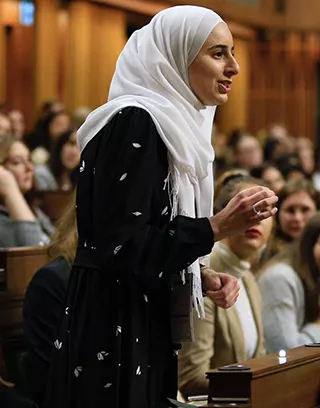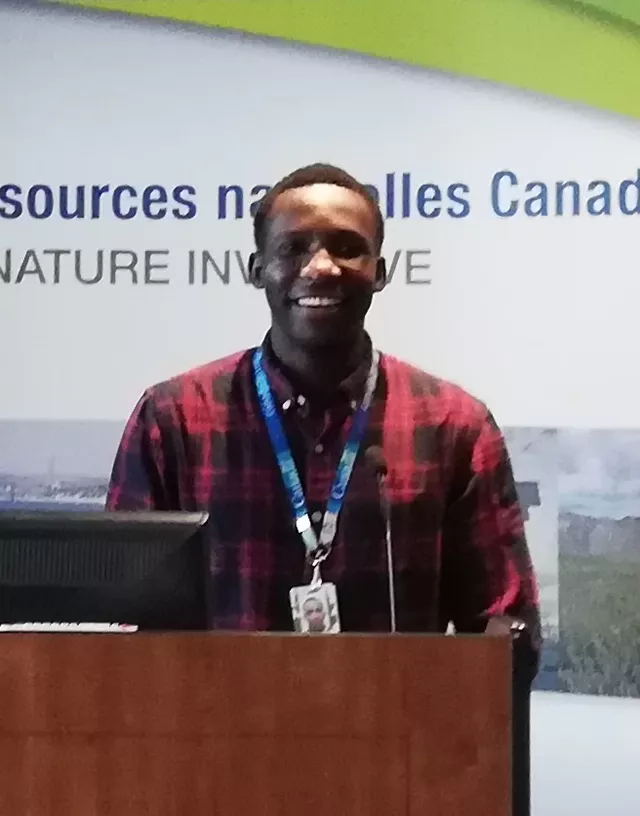
I had the unforgettable opportunity of speaking in the House of Commons on April 3rd 2019, as part of the 2019 Daughters of the Vote program. I had the honor of representing the Cariboo-Prince George riding and sitting in the seat of our wonderful MP, Todd Doherty. 337 other young women attended the event and 29 of us had the joy and privilege to speak in the House of Commons, in front of the whole nation. Many women were very passionate about topics such as poverty, discrimination, autism, indigenous rights, gang violence and so much more.
My speech focussed on creating awareness around the need for support for newcomers, and about the need to end discrimination, and more specifically Islamophobia. I believe that no person should be excluded, treated differently or live in fear because of their differences or beliefs. I am personally passionate about such issues, as they affect my Muslim community, and I believe ending all types of discrimination is important and beneficial for all Canadians. I also feel for the indigenous people of this land and I believe more needs to be done to mend relations. There needs to be a balance in helping newcomers to our country and supporting the native people of Canada.
I am so fortunate to be a student at UNBC, and I believe that the economics program is a wonderful stepping stone into politics and/or law. If you haven’t, consider majoring or joint-majoring with a Bachelor of Arts in economics!
Emmanuel Ogwal

I am a second-year UNBC student pursuing a Master of Arts in the Development Economics program.
I currently work as a co-op/intern student for the Federal Government of Canada at Natural Resources Canada in Victoria, British Columbia. This program runs from January 2 to May 9, 2019. I currently work on two forest fire research economics projects; (1) documenting the feasible approach to monetizing wildland fires in Canada and the rest of the world and; (2) assessing the cost-benefit analysis of wildland fires in communities using the Logan Lake fire in 2018 as a case study.
Economic Valuation of Wildland Fire Monetary Costs
Under this project, I am involved in reviewing literature and applying cutting-edge technology to model wildland fire behaviour by using Monte Carlo simulations of wildland fire scenarios, writing computer code in R, Python, and @RISK, using Geographic Information Systems to conduct spatial analysis, and using Analyse-it software to model the drivers of monetary costs and the cost of wildland fires in Canada—all with limited historical wildland fire data. I also use econometric models to assess the drivers of wildland fires, taking into account factors such as fire size, severity, and federal bureaucratic decision-making involved in funding wildland firefighting and mitigation.
Break-even Analysis of Community Program-level Fire Mitigation: Logan Lake 2018 Wildland Fire in British Columbia
Under this project, I work with my supervisors on analyzing the cost-benefit of fire mitigation and fuel management projects in communities, including the 2018 Logan Lake, BC wildland fire case.
We are addressing questions such as, “when does a federal government-funded wildland fire mitigation project pay?” and, “when does the federal government’s ex-ante investment spending on wildland fire management break even?”
Just like any other economic research policy project, these two projects will help me broaden my knowledge of economic principles, Geographic Information Systems (GIS), R, and Python, investment feasibility assessment tools for project planning and management, and cost-benefit analysis. By addressing wildland fire management programmes in the natural resource sector of Canada, this knowledge and experience could also be applied to other demanding sectors of the economy, such as Canada’s healthcare financing.
I am very thankful for the UNBC Student Career Centre and Natural Resources Canada for giving me the opportunity to add value to my UNBC education through this co-op/internship placement.